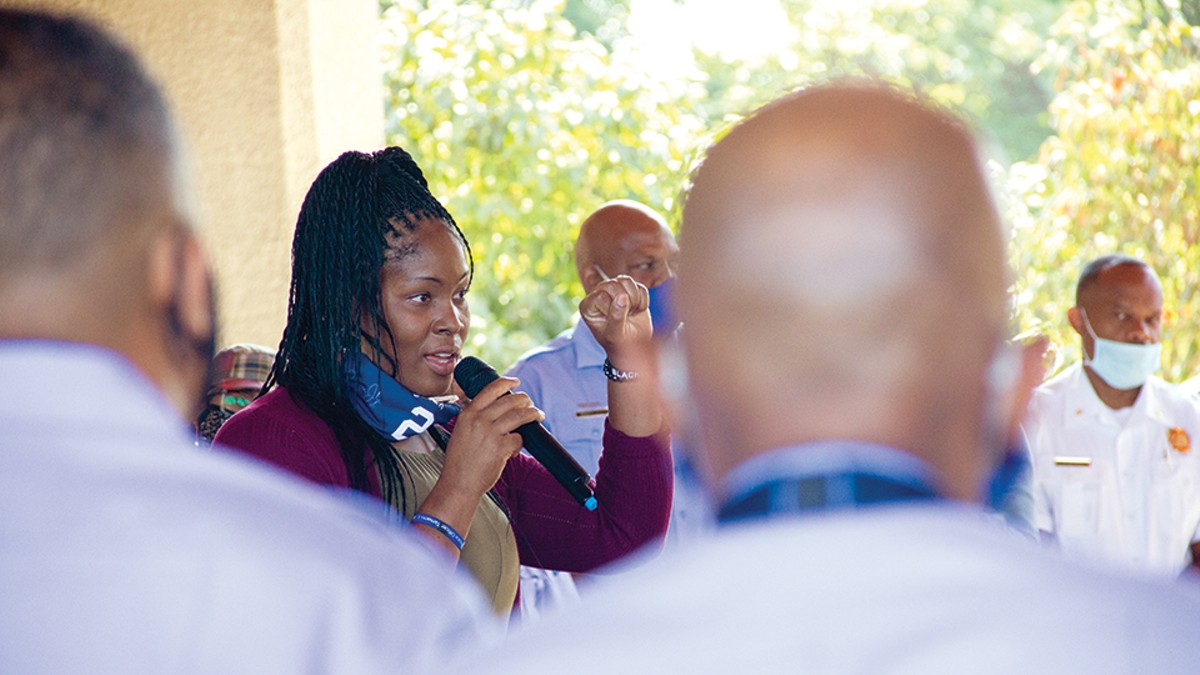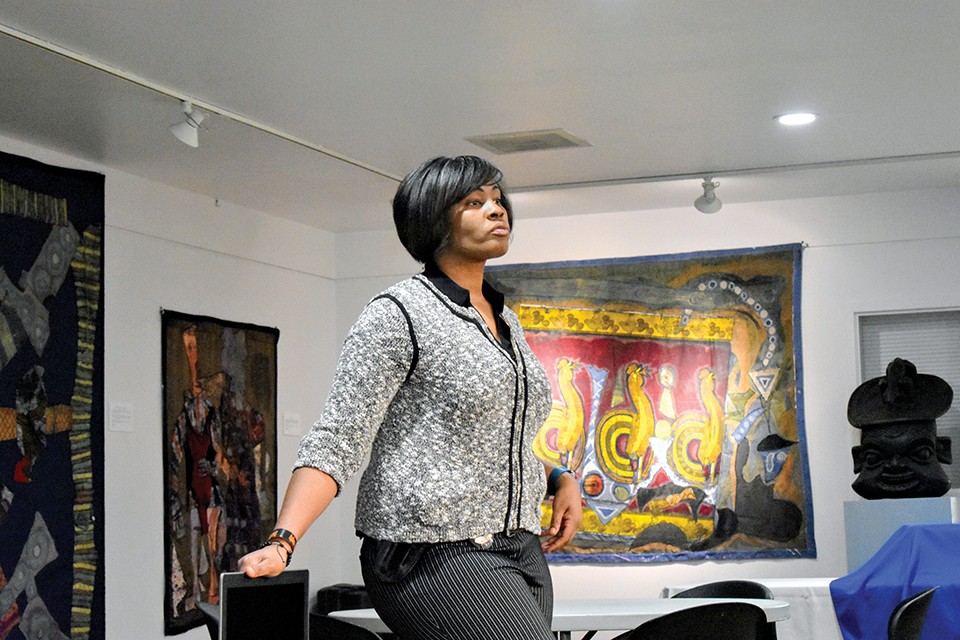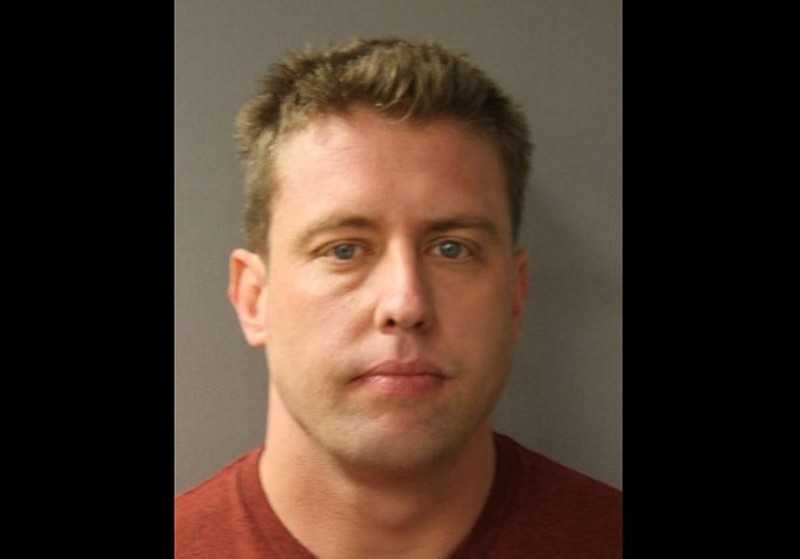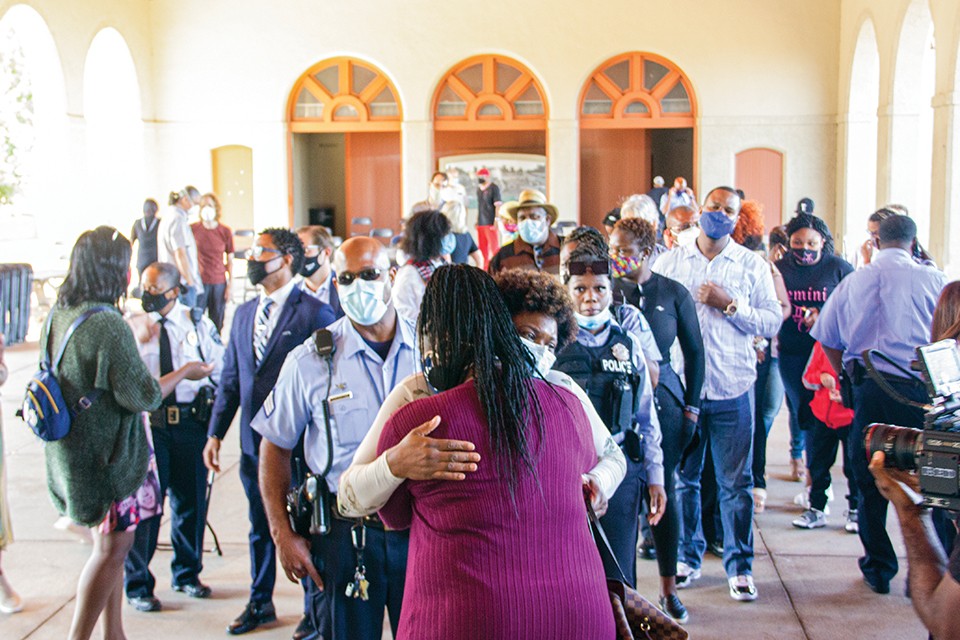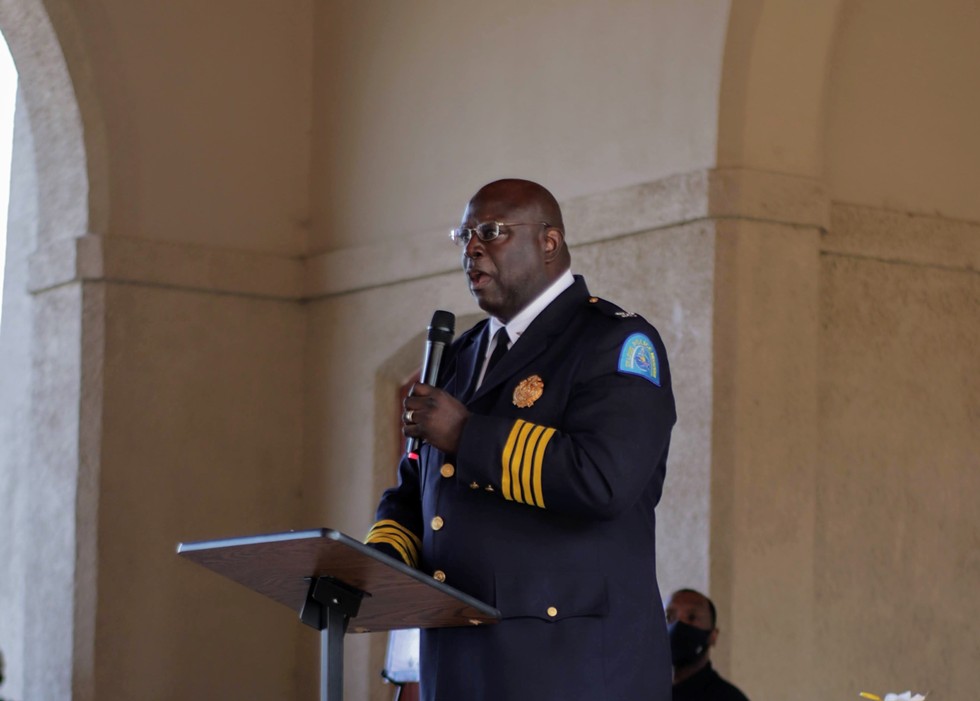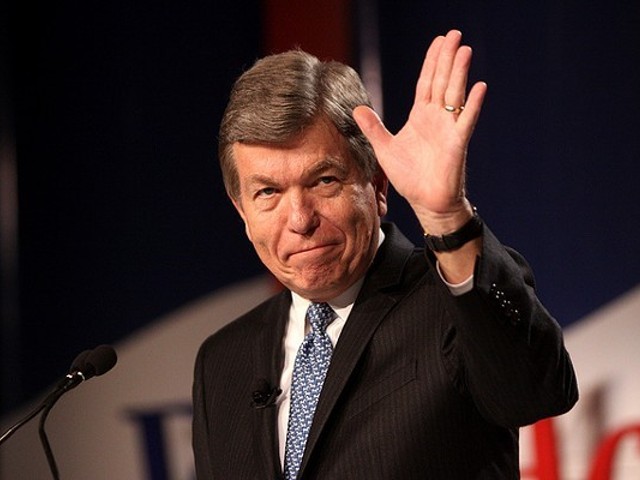In late 2014, the president of the Ethical Society of Police was a cop named Darren Wilson. No, not that Darren Wilson. The other one.
There are, in fact, two of them in St. Louis law enforcement. That summer, the release of the name of the officer who had fatally shot Michael Brown led internet sleuths to initially misidentify the actual shooter, Ferguson officer Darren Wilson, as St. Louis city officer Darren R. Wilson, who happened to be the recently elected president of ESOP.
It was an almost comic mishap at a time of community anguish and national scrutiny for the area's law enforcement. As the news spread, ESOP attempted to clarify that its unfortunately named president was not the same man who had pulled the trigger. The clarification itself sparked national stories about the ordeal of Wilson's mistaken identity (which had triggered, of course, a tsunami of harassment and death threats).
But later that year, Taylor started getting calls about Darren R. Wilson that had nothing to do with his name, and everything to do with his leadership of Ethical.
One caller asked about missing lease payments for ESOP's office space. Another was a florist waiting for an invoice to be filled. There was a call from Charter about the group's outstanding payments for its internet service.
"They asked why they weren't getting paid," she recalls. "A couple months later, we found out about Darren and what he was doing with the money."
It turned out that Wilson had run a side business as a local comedy promoter, supporting his hustle with $81,000 he'd drained from the Ethical bank accounts. Taylor says she reported him to the police department's Internal Affairs Division and helped build the case against him. In March 2014, the department suspended him without pay. One month later, a federal grand jury indicted him on nine counts of wire fraud.
It wasn't just the money for Ethical. As a police association that historically struggled to assert itself against the department and the larger SLPOA, Ethical now found itself with a president who had flouted the law and stolen from fellow officers. (When the news of the prosecution broke, the SLPOA, perhaps recognizing an opportunity to finally corner the market on police associations, reached out with an offer to "absorb" Ethical and its members, Taylor claims. She says she rejected the offer.)
While Ferguson's Darren Wilson never saw the inside of a courtroom, ESOP's Darren Wilson was charged and eventually pleaded guilty. At his sentencing, Taylor submitted a victim impact statement and asked the judge to throw the disgraced officer in federal prison for twelve months. Outside the courtroom, she told a Post-Dispatch reporter that Wilson was "a clown."
"We held him accountable," she says now. "What one person did, it did not reflect on all of us."
That may sound like a version of the "one bad apple" argument — a point often raised by police officials in attempts to separate themselves from the abuse wrought by one of their own. It's an argument that implicates the individual, not the system around them.
But Taylor isn't like other officers. Appointed president of Ethical after the scandal, she set to reshaping the group's status in the city. No longer would Ethical sit on the sidelines, quietly supporting officers in legal issues and sponsoring social events. Instead it would be loud, and argumentative, and demanding. It would be a systemic change, one instantiated in Taylor's voice.
Going forward, Taylor's ethics — and her combativeness — would lead the way.
In April 2016, Morley Swingle joined the St. Louis Circuit Attorney's Office. A veteran prosecutor in rural Missouri, Swingle's first city murder case summoned him to the scene of a shooting. It was 2 a.m., and he recalls that rain was pouring down on him as he introduced himself to the detective supervisor on the scene.
"Heather Taylor was the first homicide sergeant I met," Swingle says. "And while we were at that crime scene, we heard a gunshot that occurred on the next block. It was a second murder at another crime scene."
Swingle had spent nearly a decade as the prosecuting attorney in Cape Girardeau, where, he says, "we had maybe four murders in a year."
"So, we had two in one hour in my first call," he says ruefully. "That was my introduction to working homicide cases in the city of St. Louis."
Taylor impressed him. She was "indefatigable, an Energizer Bunny, and very persuasive." He saw in her a "natural curiosity" that seemed to guide her to the right hunches, the right doors to knock on. She found witnesses who had every reason not to talk — but they opened up to Taylor. Often, Swingle says, he would reach out to her with thoughts on a new angle for an investigation, only to find Taylor was already on it.
"The nicest compliment you can give a homicide detective," he says, "is that if I were to be murdered, I would want Heather Taylor investigating it."
Taylor wasn't just turning heads in the circuit attorney's office. By 2016, her ascension to the top of the Ethical Society of Police had produced its first major action: a "no confidence" vote directed at police Chief Sam Dotson. That summer, Ethical released a 112-page report, co-authored by Taylor, exhaustively detailing the frustration experienced by the department's Black officers. The report read like a case summary, detailing incidents of alleged retaliation, unfair disciplinary policies and missed promotions. The department could talk a big game about diversity, but the report contended it pooled police resources in whiter areas of the city, primarily downtown. The group argued that the department's promotions system had come to be defined by a racial barrier that prevented Black officers from moving to the higher ranks.
Taylor was blunt in a press conference at the time. "We hope Dotson resigns or is fired," she said.
Her hope would come true with the election of St. Louis Mayor Lyda Krewson, who announced on her first day in office in 2017 that Dotson would be retiring.
By the time of the chief's departure, Taylor and Ethical were preparing to weigh in on the upcoming trial of a white former officer, Jason Stockley, who had shot and killed Anthony Lamar Smith in 2011. Although years had passed, Circuit Attorney Jennifer Joyce charged Stockley with first-degree murder, a crime no St. Louis officer had ever been accused of in the city's history.
Taylor hadn't worked the 2011 shooting as a detective. But internal rumors about the incident — particularly Stockley's aggressive tactics and his penchant for carrying an unsanctioned AK-47 Drago pistol on duty — had percolated through the department for years. By the time Stockley was charged with murder, reporters had published videos of the in-car dashcam that had captured Stockley telling his partner "I'm going to kill this motherfucker," minutes before he did just that, shooting Smith, a father of a young daughter, five times through a car's driver-side window.
Stockley had his supporters. The St. Louis Police Officers' Association paid his $100,000 bond and mounted his legal defense with the union's lawyers. They argued that he had feared for his life after spotting Smith reaching for a revolver on the passenger seat.
The SLPOA's message was what it had always been: It would have its officers' backs, no matter what policies they may have violated or tragedies they escalated. Taylor says its position, and particularly its use of members' dues to pay Stockley's bond, "was disgusting."
Stockley's trial lasted seven days in early August 2017, and then it was left to Judge Timothy Wilson to make a decision. On September 12, while St. Louis awaited a ruling, Ethical released a video in which Taylor addressed the murder charges against a former fellow officer.
Like a detective, she analyzed the available evidence. And then she delivered a verdict.
"There were several things we found alarming," she said in the video, "that violated policy, that led us to believe that his actions were that of someone that had committed murder. He wasn't defending himself in the line of duty."
In Taylor's perspective, Stockley was undeserving of the loyalty of the St. Louis Police Officers' Association. She'd watched the dashcam video showing Stockley and a partner chasing Smith by car, dangerously weaving through traffic as they closed in. Stockley's outburst on the dashcam appeared to show his premeditation. A bystander's footage of the scene's aftermath, which emerged in 2016, set off further alarms in her detective instincts: Stockley claimed Smith was reaching for a revolver before he shot him through the driver-side window — but after the shooting, Stockley had recovered the revolver without wearing gloves, contaminating the evidence with his DNA.
In fact, only Stockley's DNA had been detected on the revolver. This was the conduct the SLPOA sought to defend.
At trial, prosecutors emphasized the single source of the DNA and attempted to argue that Stockley had planted the weapon to cover up a murder. But on cross-examination, the case was ultimately shaky. The seemingly damning evidence was steadily weakened by expert testimony from the department's forensics investigators. The fact that Stockley had touched the revolver barehanded violated policy, but it also accounted for his DNA on the weapon. It didn't prove he'd planted it.
The case, as so many police shootings do, came down to Stockley's claim that he'd acted "out of fear for his life." On September 15, 2017, three days after Taylor called for Stockley's conviction, Wilson returned his verdict: not guilty.
"I think Judge Wilson is a coward," Taylor says now, pointing out that the judge retired almost immediately after finishing the case. She maintains that Smith was murdered. She's still disgusted by St. Louis Police Officers' Association's role in supporting Stockley's defense. She doesn't see loyalty in their blue code, but blindness.
"That thin blue line is there, yeah, but that doesn't mean you can't cross it," she says. "And you should cross it. You have to."
It is September 25, 2020, and Heather Taylor is crying.
After retiring, her plan is to attend law school in Florida, but she still needs to say goodbye to a lot of people at the World's Fair Pavilion.
"I love so many of you," she tells the masked crowd of officers and ESOP members. The audience has moved inward, standing now nearly shoulder to shoulder in two groups on either side of the retiring homicide detective. One by one, she addresses officers by name: the commanders who believed in her, her classmates from the academy, the next crop of leaders of Ethical. She thanks them. She tells them she loves them.
There are important people in Taylor's life missing from the crowd. The ongoing pandemic kept her parents at home, while her cousins watched via livestream. But under the shade of the pavilion is her brother, Diamond Slater, the beloved sibling who spent most of his life in prison for murder before his release in 2008. She thanks him, too. She speaks of their separation and how it "pushed me into this field."
"Most of all," she continues, "for our aunt, who's not here because she was killed by law enforcement. Aunt Denise, I'm here because of you."
These are losses that will never leave her. In the crowd is the mother of a murdered seventeen-year-old boy whose case Taylor spent years attempting to solve, but could never close. It's one of a number of cases that still bother her. That includes the killing of Kerwin Harris, who died in 2012 after he was put in a chokehold by a St. Louis police officer while a second officer tased him six times. Harris' death became one of Taylor's homicide scenes. According to the police report, a witness claimed they heard an officer calling Harris the n-word as the 39-year-old was being choked out. Taylor submitted her case to the circuit attorney's office for criminal charges, but they never came. The officer who choked Harris remains on the force.
In some ways, not much has changed for Black officers in St. Louis in the past twenty years. The department remains roughly 30 percent Black, though not for lack of interest. A 2019 report on the department's minority recruitment (conducted by the FUSE nonprofit at the behest of the city) faulted "barriers" in its hiring practices, noting that "diverse applicants apply more than white applicants" while at the same time "the demographics of the St. Louis Metropolitan Police Department do not reflect the communities in which they serve."
And the divisions between the city's two police associations couldn't be more stark. The St. Louis Police Officers' Association is currently defending five officers charged by federal prosecutors in the beating of a Black officer who was working undercover as a protester during a demonstration against the 2017 Stockley verdict. The officers' text messages revealed giddy excitement over the opportunity to "whoop some ass" on their protest detail. The beaten officer, Luther Hall, is represented by the Ethical Society of Police.
But there are signs of change. At Taylor's retirement ceremony, standing to her right is St. Louis County police officer Shanette Hall. In June, St. Louis County Executive Sam Page signed a memorandum of understanding that officially recognizes the Ethical Society of Police and its 65 members in the St. Louis County Police Department.
Taylor, holding back further tears, locks her gaze on the younger officer in the black Ethical Society polo.
"Shanette," she says, "I see so much of you, of who you are, in me. I'm worried" — her eyes move along the line of uniforms before her — "I'm worried that this struggle will be difficult for her," she adds. "I need everyone here to lift her up."
Finally, Taylor addresses Chief Hayden.
"As a mentor, I'm proud of you," she tells the chief. She tells him that she supports him, even if at times she disagrees with him "most definitely."
"I know it's been difficult," the sergeant tells the chief. "Sometimes we've made it difficult, those of us who wear this uniform," she says, and adds, "both Black and white."
It's time. The officers in the crowd turn the volume down on their radios as Taylor calls into dispatch for a "68" — police code for "out of service."
"4215 ..." she says into the radio, her voice traveling out into patrol cars and precincts.
"Everybody, stay safe, be fair, take care of each other and our community."
Over the radio, the voice of the dispatcher crackles in response.
"4215 ... Heather Taylor, 6009 ... is 68 for the last time."

